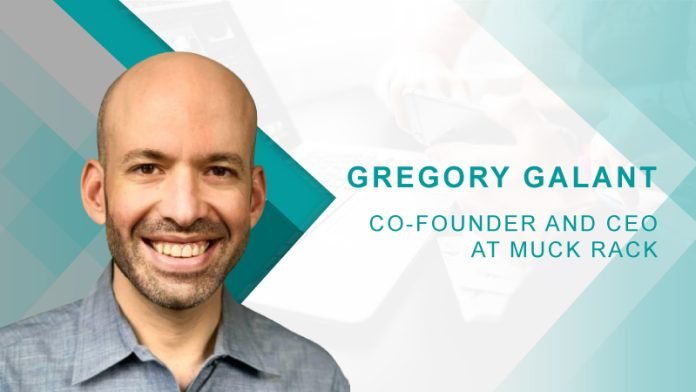Gregory, please tell us about your role at Muck Rack and how as a Public Relations Management (PRM) platform it empowers organizations to build relationships with the media and manage crisis risk?
I’m Gregory Galant, cofounder and CEO of Muck Rack. We enable more than 4,000 organizations worldwide to build trust, tell their stories and demonstrate the unique value of earned media by helping them generate positive media coverage, monitor mentions to manage brand reputation and analyze the impact of PR on business outcomes through our public relations management (PRM) platform.
Muck Rack is used by various organizations, including Golin, Blue Apron and Duolingo. How do these organizations leverage Muck Rack to enhance their PR strategies, and what impact has it had on their business outcomes?
Leading brands and agencies leverage Muck Rack to support their PR efforts. We’re known for having the best and most comprehensive media database, but our platform supports the whole communications team’s workflow, from those who research, pitch and track media coverage; to those leaders who need real-time analysis and reports on how campaigns are performing.
Golin, an integrated agency with 50 offices throughout the Americas, EMEA and Asia, leverages Muck Rack to curate powerful, targeted media lists and monitor mentions of clients and competitors. They also measure the connectivity and engagement of a given press hit with our Who Shared My Link feature and Coverage Reports.
Meal delivery service Blue Apron uses our media monitoring feature to keep a pulse on what is being said and how, in addition to finding the right journalists to pitch. Muck Rack allows them to make fast and informed decisions, which has been critical for their in-house PR team.
Duolingo has been a longtime customer and fan of Muck Rack. Their team loves us for our ability to curate topic-specific media lists and monitor coverage through Muck Rack Alerts. Our platform has also allowed them to expand their international media outreach, which has been a big win for their organization.
Could you elaborate on how journalists utilize Muck Rack’s free tools to showcase their portfolios, analyze news, and measure the impact of their stories?
Tens of thousands of journalists use Muck Rack to showcase their work with our free, automatically updated portfolios. They can also share pitching preferences, instantly analyze news on any topic using our Muck Rack Trends tool and see which journalists have shared their articles with our Who Shared My Link tool. Journalists can also access monthly roundups of top media outlets by topic, media type or locations worldwide and the latest media moves and job updates via a tailored feed or daily email digest.
Verified journalists can search for other journalists, podcasters and podcasts and articles as well as media outlets spanning print, television, radio, blogs, newsletters and more. They can also create media lists of journalists and receive alerts when they publish a new article, post on social media or change jobs. Plus, verified journalists can set alerts when their stories are picked up or shared and track stories and Tweets/Xs about any company, brand, story angle, other journalist and more. To ensure the integrity of our listings, Muck Rack’s editors review all verification requests and vet them against our strict criteria.
In 2021, you became a fully remote company and launched The Work Remotely Forever Pledge. Can you provide insights into the motivation behind this?
Muck Rack has been remote first since our founding in 2009. When more companies became remote during the pandemic, I knew it was important to double down on remote work to allow existing employees flexibility while attracting the best talent regardless of location. As a result, we closed our Soho office in June 2021 and promised never to force anyone to work from an office again.
Shortly after, I launched the Work Remotely Forever pledge, a commitment by business leaders to not make their employees work from an office. Since then, more than 75 companies have joined.
The decision to be a fully distributed company has allowed us to hire the best talent regardless of location and trust our employees to do their best work in a way that works for them. A recent Inc. survey of Muck Rack employees found that 97% feel engaged at work, and we’ve more than tripled our staff in the last three years.
What’s the key to a successful remote work culture?
While providing employees with the ability to work from various locations might seem like enough, a lot needs to happen to build and maintain a strong remote work culture. This involves ensuring that employees are engaged, present, and growing in their roles, in addition to feeling that their well-being and mental health are prioritized.
To ensure that distributed work works for everyone, we focus on three key elements: technology, workspace and productivity support; resources and policies to support mental health and well-being; and collaboration and community. In addition, it’s critical to set up policies that hold everyone accountable while encouraging productivity and connectivity.
We believe that distributed work has given us the advantage of finding the best talent, regardless of their location. Hours in an office do not equal productivity, and just because we don’t have an office doesn’t mean we don’t work together in real life. We have regional hubs that allow employees to co-work and get together socially and we offer monthly coworking stipends to foster real-life collaboration with colleagues. We also have offsites at the team level and hosted our first annual all-company retreat in Mexico in December 2023.
Muck Rack has employees in 33 states and eight countries, with over 250 employees. We’ve also repeatedly been recognized for workplace culture by industry leaders, including Inc., Quartz and BuiltIn.
Lots of CEOs are making arguments for why remote work isn’t good for business, but we’re proof that remote work works. You must invest in your distributed work culture as you invest in an in-office culture to see the benefits.
Over 75 companies have signed The Work Remotely Forever Pledge. Can you share examples of companies that have embraced remote work successfully? How has it positively influenced their work culture and productivity?
While many tech companies have backtracked on their remote work policies, there are a handful that are sticking with it. A few that I think have continued to embrace remote work and have done it well are tech companies like Spotify, Airbnb and Dropbox.
Similar to how we approach remote work at Muck Rack, Dropbox doesn’t mandate any amount of in-office presence, and while they feel there is no substitute for in-person collaboration, two- or three-day offsites per quarter have worked best for them. Dropbox also encourages flexible work hours and has expressed that flexibility has been an incredible recruitment superpower.
You are a frequent speaker and writer on various topics. What are some key themes you often address in your presentations, and how do you see these themes shaping the current landscape of social media, marketing, PR, entrepreneurship, remote work, and journalism?
I see a lot of entrepreneurs who only focus on the short-term, raising money and then having to deliver big numbers to their investors in a short period of time and failing to do so. Then, every 18 months, they have to go out fundraising and bring in random people to join their board who gain serious influence on the future of their business.
Through my experience building Muck Rack, though slow and steady, I’ve had the opportunity to share invaluable learnings and lessons with other entrepreneurs in various stages of growing their businesses.
In conclusion, what advice do you have for individuals and businesses navigating the landscape of social media, marketing, and PR, especially in the context of remote work and evolving business environments?
The media landscape is always changing, so make sure you’re staying on top of trends and challenges journalists are facing that might impact your earned media.
If you’re pitching media outlets during a time of cost-cutting and headcount reduction, you have to determine how to break through the noise with fewer journalists whose workloads are only increasing while being sensitive to headwinds facing the media industry.
Our State of Journalism survey found that almost half of journalists believe short-form video will grow in popularity next year. So, to marketers and PR professionals, I’d ask, are you factoring short-form video into your strategy based on this trend, and if so, how will you do it while still maintaining your key brand values and business objectives?
Explore HRtech News for the latest Tech Trends in Human Resources Technology.

Gregory Galant Co-Founder and CEO at Muck Rack
Gregory Galant is the cofounder and CEO of Muck Rack, the public relationship management platform that helps organizations find the right journalists to pitch, report on media coverage and prove the value of their work. It’s used by thousands of organizations, including Google, Pfizer, Golin, Zapier and Duolingo. Muck Rack is also the solution of choice for journalists, who use its free, automatically updated portfolios to showcase their work and provide information about what stories they’re looking for. Greg’s also the co-creator and executive producer of The Shorty Awards, which honor the best of social media. Past winners include Lizzo, Ricky Gervais, Rebel Wilson, Trevor Noah, Conan O’Brien, Issa Rae, Marques Brownlee, Sesame Street, Neil Patrick Harris, Mike Bloomberg and NASA. In 2021, Greg founded The Work Remotely Forever Pledge, a commitment by business leaders who promise not to force their employees to work from an office. Since launching, more than 75 companies have signed on. Greg is a frequent speaker and writer on topics related to social media, marketing, PR, entrepreneurship, remote work and journalism. He’s presented at SXSW, Web Summit, Harvard Business School, Le Web and The International Journalism Festival, and his columns have appeared in Fortune, Forbes and Business Insider. Along with his companies, Greg has been cited in and interviewed by numerous media outlets, including The New York Times, The Wall Street Journal, The Associated Press, Business News Daily, Editor & Publisher, Entrepreneur, Fast Company, Inc., Poynter, PR News and PRWeek. BusinessWeek named him one of the “Best Young Tech Entrepreneurs,” and BuiltIn named Muck Rack one of the “Best Remote Companies to Work For in 2022.”












